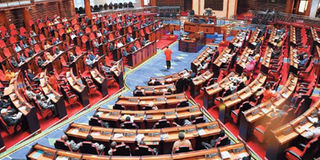Don’t sign EU accord, Parliament tells govt

Parliament in session in Dodoma. PHOTO | FILE
What you need to know:
- According to the lawmakers, EPA in its current form is bad for the country’s economic development and should be rejected.
- The government, through the Ministry of Industry, Trade and Investment, tabled the agreement in Parliament on Monday, seeking MPs advice on the way forward.
Dodoma. MPs yesterday unanimously advised the government against signing the Economic Partnership Agreement (EPA) between the European Union and the East African Community member states.
According to the lawmakers, EPA in its current form is bad for the country’s economic development and should be rejected.
The government, through the Ministry of Industry, Trade and Investment, tabled the agreement in Parliament on Monday, seeking MPs advice on the way forward.
A day earlier, MPs were familiarised with EPA’s contents by three academics from the University of Dar es Salaam – Prof Palamagamba Kabudi, Dr John Jingu and Dr Ng’wanza Kamata – who all urged Tanzania to reject the deal.
Debating the agreement yesterday, MPs from both the ruling CCM and Opposition maintained that the agreement was not in favour of Tanzania’s development vision, and should be renegotiated on terms that would take into account the country’s interests. However, a handful of legislators advised the government to propose the way forward after rejecting the deal.
Ms Saada Mkuya (Welezo-CCM) said the move would affect development cooperation between EU and Tanzania, particularly with regard to aid.
“Yes, we are rejecting this deal because it is bad for our economy, but how far are we prepared to deal with the consequences? I suggest that we start to prepare early and allocate funds in the next budget for implementing development projects currently financed by the EU,” the former Finance minister said.
“The minister (Mr Charles Mwijage) should also go to Zanzibar and inform members of the House of Representatives of this development because Zanzibar has also been a beneficiary of EU funding.”
Ms Mkuya said the government should take the EPA deal as a challenge in its endeavour to build a resilient economy and industrial base.
“As we strive to realise our industrial vision we definitely will need similar agreements. The future lies in international trade, and we must be prepared to compete. We need to build a culture of looking for alternatives.”
Mr James ole Milya (Simanjiro-Chadema) said the Opposition also rejected the agreement in its current form, but added that there were questions that needed to be answered.
“We should ask ourselves what kind of industries we want to build and how long it will take us to reach where we want to be. If we are not careful goods from the EU will still flood our market whether we like it or not,” he said.
Mr ole Millya added that Tanzanian negotiators should go back to the drawing board and come up with concrete arguments on industries that need to be protected.
Mr Zitto Kabwe (Kigoma Urban-ACT-Wazalendo) said if Tanzania were to sign the deal today it would lose $853 million in revenue in the next 25 years, while the EAC would lose Sh8 trillion as a bloc. “The tricky part is that the EU knows that we will incur losses, but they don’t seem too keen on a compensation framework. We need to be firm.”
Mr Kabwe also sought to explain why Kenya rushed to sign the agreement without considering the concerns of other EAC member states.
“The answer is simple...they moved to protect their horticulture trade with the EU. They were ready to sacrifice everything to protect their interests. We should do the same.”
Mr Mussa Azzan (Ilala-CCM) said two key EU parliamentary committees were not reading from the same script as far as the deal is concerned, and that should serve as a warning to Tanzania.
“The International Trade Committee supports the agreement, while the International Development Committee is totally against it. Some EU MPs are saying Kenya readily signed the treaty because it is not in the least developed countries category…if we sign this deal we are done for.”
Mr Hamidu Bobali (Mchinga-CUF) said he and his party were against the signing of EPA, but took issue with MPs discussing Kenya’s decision to accept the deal.
“They have decided to sign the agreement because it is beneficial to them. They have goods that have a ready market in the EU. We should blame ourselves for our laziness and indifference. We now need to focus our energy on building our capacity so that we can compete internationally.”
Mr Kangi Lugola (Mwibara-CCM) and Mr Joseph Kakunda (Sikonge-CCM) dismissed EPA as a “colonial treaty”.
After MPs unanimously spoke out against the deal, Speaker Job Ndugai said, “You need to be mad to ratify the treaty in its current form.”




